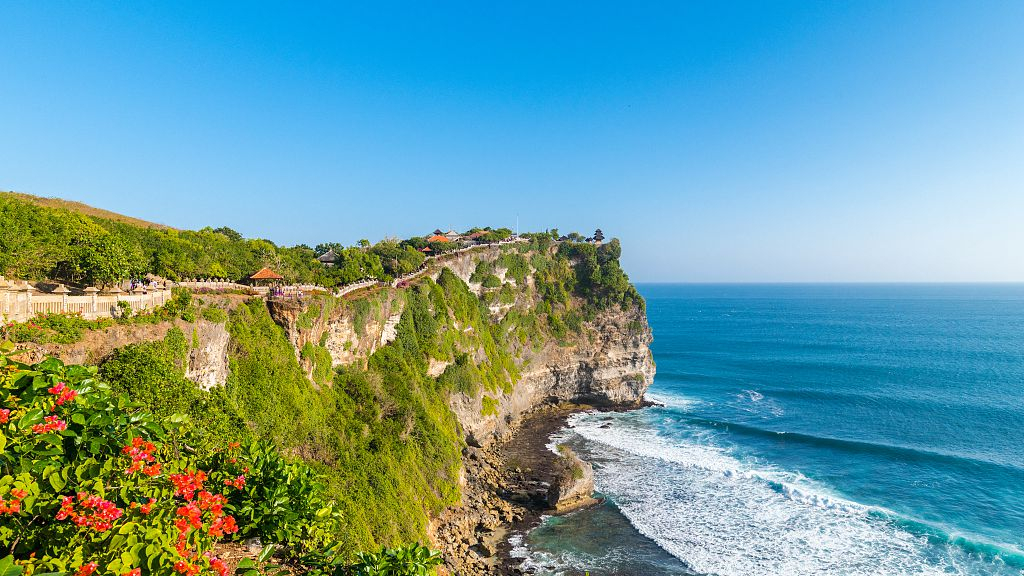
(Photo: CGTN)
Spread across a chain of thousands of islands between Asia and Australia, Indonesia has the world's largest Muslim population and Southeast Asia's biggest economy.
Ethnically it is highly diverse, with more than 300 local languages. The people range from rural hunter-gatherers to a modern urban elite.
Full name: Republic of Indonesia
Capital: Jakarta
Population: 262 million
Area: 1.9 million sq km
Major languages: Indonesian, 300 regional languages
Life expectancy: 67 years (men), 71 years (women)
Currency: Rupiah
Membership in UN, World Bank
The main economic data for the 2017 fiscal year are as follows:
Gross domestic product: $1.015 trillion
Economic growth rate: 5.07 percent
Head of State: Joko Widodo
China-Indonesia Relations
In 2018, Chinese President Xi Jinping met with Indonesian President Joko Widodo and reached a series of important consensus on deepening ties.
Both China and Indonesia are major developing countries and emerging economies and they share similar position in many fields, said Xi, adding that China is willing to maintain high-level communication with Indonesia and guide the development of bilateral ties from a strategic height and long-term perspective.
The two countries have signed a memorandum of understanding in 2018 on the Belt and Road Initiative and Indonesia's Vision of Global Maritime Fulcrum.
China also attaches importance to the Regional Comprehensive Economic Corridor initiative proposed by President Widodo.
In 2013, the bilateral relations between the People's Republic of China and the Republic of Indonesia continued to maintain a sound momentum with positive results achieved in practical cooperation in various fields.
The two sides had frequent high-level exchanges. In October, President Xi Jinping paid a state visit to Indonesia. The two countries issued the Future Direction of China-Indonesia Comprehensive Strategic Partnership. President Xi Jinping and President Susilo Bambang Yudhoyono jointly announced their decision to upgrade the bilateral relations to a comprehensive strategic partnership and witnessed the signing of documents for cooperation in the economic, trade, financial, fishery, space and tourism fields. This visit charted the course for future development of China-Indonesia relations, which was a milestone in the history of bilateral relations. In the same month, Premier Li Keqiang had a bilateral meeting with President Yudhoyono on the sidelines of the East Asia Summit in Brunei. In November, Sun Chunlan, member of the Political Bureau of the CPC Central Committee and Secretary of CPC Tianjin Municipal Committee, visited Indonesia. In December, State Councilor and Defense Minister General Chang Wanquan paid an official goodwill visit to Indonesia. In September, State Councilor Yang Jiechi visited Indonesia and co-chaired with Coordinating Minister Djoko Suyanto the fourth bilateral dialogue between the State Councilor of China and the Coordinating Minister for Political, Legal and Security Affairs of Indonesia. In August, CPPCC Vice Chairman and Minister of Science and Technology Wan Gang visited Indonesia. In May, Foreign Minister Wang Yi visited Indonesia. In October, Sidarto Danusubroto, Chairman of the People's Consultative Assembly, visited China.
Fruitful results have been achieved in economic cooperation and trade between the two countries. Bilateral trade registered a fairly fast growth. And China's direct investment in Indonesia increased rapidly. The two countries signed several important cooperation documents such as the China-Indonesia Five-Year Development Program for Economic and Trade Cooperation and the Agreement Between the Government of the People's Republic of China and the Government of the Republic of Indonesia on Indonesia-China Integrated Industrial Parks. The central banks of the two countries renewed the Chinese Yuan/Indonesian Rupiah Bilateral Currency Swap Arrangement for a total value of RMB 100 billion. The two countries made positive progress in their cooperation in infrastructure, energy, resources, manufacturing and agriculture. Efforts were made to put to good use the preferential export buyer's credit that China provided to Indonesia.
The two sides expanded their defense, maritime and space cooperation at a faster pace. The defense ministries of the two countries held the fifth defense and security consultation and put in place the mechanism of Navy to Navy Cooperation Talk and had its first meeting. The eighth technical committee meeting on maritime cooperation was convened and smooth progress was made in relevant cooperation projects. The two sides signed the MOU on Fisheries Cooperation Between the Ministry of Agriculture of the People's Republic of China and the Ministry of Marine Affairs and Fisheries of the Republic of Indonesia and agreed to deepen pragmatic fisheries cooperation. The two countries signed the Agreement Between the Government of the People's Republic of China and the Government of the Republic of Indonesia on Cooperation in the Exploration and Peaceful Use of Outer Space and agreed to set up a joint aerospace cooperation committee to promote cooperation in this field.
The two countries saw improvement in their consular relations and expanded people-to-people and cultural exchanges. The two sides agreed on the establishment of a consulate general by China in Dempasar. The MOU Between the National Tourism Administration of the People's Republic of China and the Ministry of Tourism and Creative Economy of the Republic of Indonesia on Tourism Cooperation was signed. Another Indonesian delegation of one hundred young people visited China at the invitation of the Chinese side. The number of students of the two countries studying in each other's country continued to rise. China sent volunteer Chinese teachers to Indonesia. The six Confucius Institutes in Indonesia went well.
The two countries worked together to safeguard the interests of developing countries and to ensure smooth communication and close cooperation at multilateral platforms and institutions such as the G20, APEC, WTO and UN.


